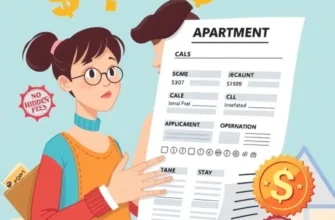Finding the perfect apartment can feel like searching for a unicorn in a field of horses. Between the excitement of moving out and the anxiety of signing that lease, it’s easy to overlook potential red flags. Rental scams have become all too common, especially for young adults embarking on their first independent living adventure. From the charming couple with a ‘great deal’ to mysterious landlords whose only contact is through email, these scams come in various forms. Whether you’re a first-time renter, a young professional trying to navigate the housing market, or a couple looking for your cozy nook, understanding rental scams is not just advisable—it’s essential. Read on for some laughs, practical tips, and maybe a good horror story about what not to do when searching for your home sweet home.
Recognizing the Red Flags

When searching for a rental, young renters must become detectives, sifting through listings to avoid scams. Start by examining rental prices in your target area. Unrealistically low prices can be indicative of a scam. If the apartment seems like a steal, compare the cost to other local listings. A considerably lower price often signifies a red flag that merits further investigation.
Next, scrutinize the advertisement for any missing address details. Listings lacking a full address may be concealing an issue. Legitimate ads usually provide comprehensive location information. If an address is absent, request it from the contact to ensure the property exists. Utilize online maps to cross-verify the location and check the neighborhood safety, especially if you find the area desirable.
Pay close attention to the quality of photos. Scammers often use images from other legitimate listings or employ stock images. Conduct a reverse image search to determine if those pictures appear elsewhere online. If the same photos appear on multiple listings under different names or locations, avoid that property altogether.
Communication style also holds key clues. Be cautious of landlords or agents with poor grammar or an urgent communication style, often pushing for quick decisions without viewing. These tactics prey on the eagerness of first-time renters. Insist on seeing the apartment in person before any payment is made. Genuine landlords usually offer walkthroughs.
Another significant red flag is when you’re asked for a large security deposit upfront without a proper contract. Authentic processes involve formal lease agreements and tenant screening. Always demand a clear, written contract and ensure all terms are understood before signing.
Finally, verify your rental through independent research. Consult resources like online renter forums or local rental associations to confirm the legitimacy of both the listing and the landlord. Engaging with community forums can be beneficial, providing insight from locals or past tenants about the property or landlord.
For those navigating the rental terrain, understanding the signs of a scam can save you from financial pitfalls. Ensuring verified addresses, realistic pricing, photo authenticity, proper documentation, and community feedback can differentiate a credible rental from a potential scam. For more tips on settling into a new rental, check out our apartment move-in essentials. Trust your instincts—when something seems off, it usually is.
Scam Prevention Strategies

When searching for an apartment, vigilance is your best ally. Start by thoroughly researching listings. Double-check the legitimacy of the property by comparing it across various platforms. If you encounter inconsistencies in images, descriptions, or pricing, this should raise red flags. Be cautious of overly attractive deals that seem too good to be true—they often are.
Always verify the identity of the landlord or property manager. Request contact details and conduct a quick online search to ensure they are associated with a legitimate business. If possible, reach out to previous renters or the local community to gather insights about the property and landlord.
Meeting the landlord in person is crucial. During an in-person meeting, you can assess their professionalism and intentions. This step also gives you the opportunity to ask detailed questions about the lease terms, the neighborhood, and other important matters. Avoid landlords who make excuses to avoid face-to-face meetings.
Secure communication channels are a must. Use email or official rental platform messaging systems rather than personal phone numbers or messaging apps to prevent scammers from gaining personal information. Be wary of landlords who request sensitive details early in the conversation.
Inspecting the property yourself before signing any paperwork is vital. A personal walkthrough helps confirm that the property exists and matches the listing’s description. Evaluate the condition of the apartment and note any discrepancies that might attract hidden fees later on.
When handling financial transactions, prioritize secure payment methods. Avoid wire transfers or money orders, as these are harder to trace and often used by scammers. Opt for payments through official rental platforms or use a reliable third-party service that offers payment protection.
Being aware of common scams can also be advantageous. For instance, if a landlord claims to be abroad and asks you to send money to secure the rental, exercise extreme caution. Similarly, be suspicious of requests for large deposits or first month’s rent without a formal process.
To further bolster your security, familiarize yourself with how to resolve potential disputes such as incorrect billing. Check out this guide on resolving rental billing errors for insights on navigating financial discrepancies.
Lastly, trust your instincts. If something feels off, pause and reassess. Feeling uneasy about a scenario is reason enough to re-evaluate the potential rental. A methodical and cautious approach can significantly reduce the risk of falling victim to rental scams.
Final words
Navigating the rental landscape can feel daunting, but with the right tools and a sense of humor, you can spot the tricksters before they pull the wool over your eyes. Armed with knowledge about red flags and some smart prevention strategies, you’ll be well equipped to face this challenge head-on. Remember, when it comes to securing your dream apartment, trust your instincts, do your homework, and never hesitate to walk away from a deal that feels a little too good to be true. Happy apartment hunting!









